Key takeaways:
- Organic wine production relies on grapes grown without synthetic chemicals, emphasizing sustainable practices that benefit the environment and health.
- Biodynamic farming extends organic principles by incorporating ecological balance, lunar cycles, and self-sustainability, creating unique flavor profiles in wine.
- The future of biodynamic wine is promising, with increasing consumer demand for sustainable options and a new generation of winemakers embracing collaborative practices.
- Challenges for biodynamic producers include rigorous adherence to practices, financial sustainability, and overcoming consumer skepticism about their methods.

What is organic wine production
Organic wine production refers to the process of making wine using grapes grown without synthetic pesticides, herbicides, or fertilizers. I remember the first time I tasted a bottle of organic wine; it was vibrant and fresh, almost like drinking the essence of the vineyard itself. Isn’t it amazing how the environment shapes the flavor?
In organic farming, the focus is on maintaining healthy soil and ecosystems, which really resonates with me. When I learned that organic vineyards often employ natural methods like cover cropping and composting, I felt inspired by the commitment to sustainability. It’s a reminder that what we consume can reflect our values.
The certification process for organic wines ensures that the grapes are nurtured without harmful chemicals. I’ve often wondered how much better our planet could be if more farmers adopted these practices. It emphasizes a holistic approach not just to grape-growing but to the entire winemaking experience.
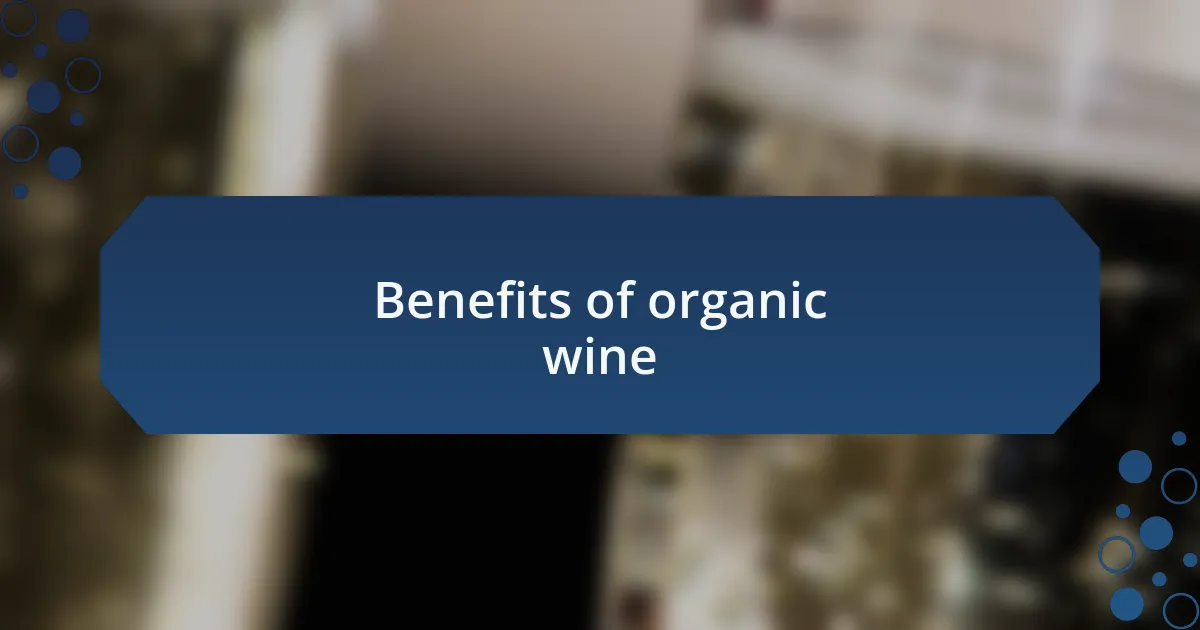
Benefits of organic wine
One of the most significant benefits of organic wine is its impact on health. When I delve into a glass of organic wine, I appreciate knowing that it’s made without synthetic chemicals that can linger in conventional wines. I often think about how much better I feel when I choose organic options—not just in wine but across all my food choices. Doesn’t it feel reassuring to sip a drink that celebrates both your health and the earth?
Moreover, organic wine production promotes biodiversity in the vineyard ecosystem, which I find fascinating. I’ve visited vineyards that embrace this principle, and it’s incredible to see how varied plants and insects coexist harmoniously. This diversity doesn’t just benefit the environment; it enhances the wine’s flavor and complexity. It makes me wonder how many layers of taste we miss out on from conventional practices that prioritize uniformity.
Finally, supporting organic wine contributes to a larger movement towards sustainable agriculture. I remember chatting with a winemaker who passionately described their commitment to organic methods, explaining how it fosters not only better wine but a healthier planet. It’s a win-win situation—every bottle purchased becomes a small act of support for eco-friendly practices. Can you imagine the collective impact we could have if we all made this choice?
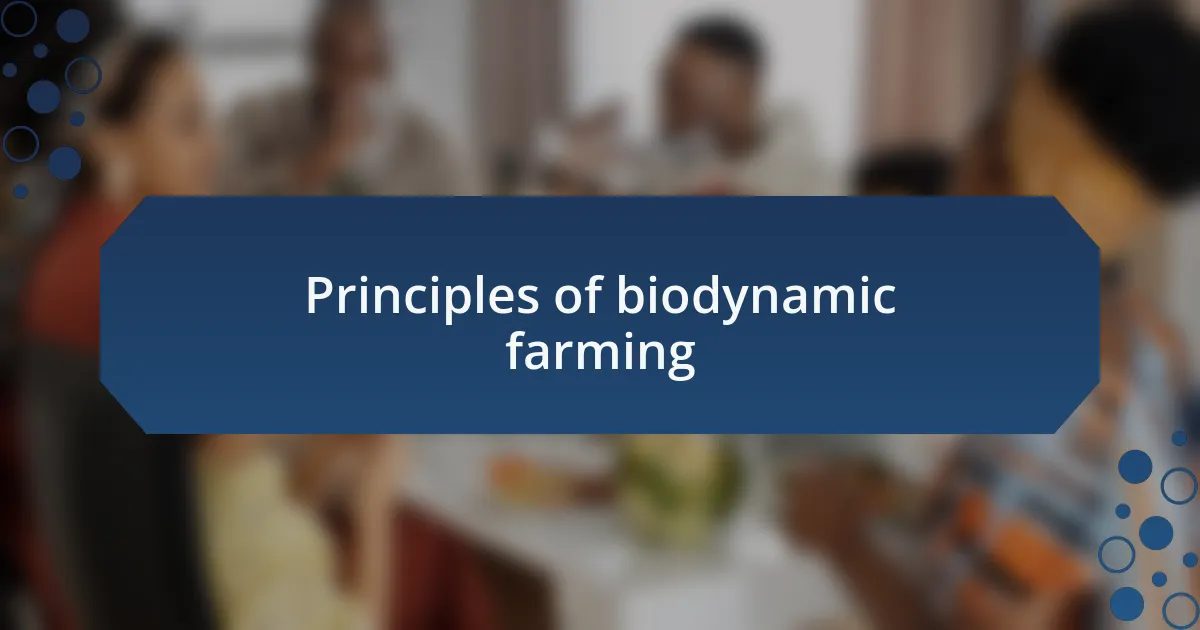
Principles of biodynamic farming
Biodynamic farming operates on principles that extend beyond organic practices, rooted in the philosophy of holistic agriculture. I remember visiting a biodynamic vineyard where the winemaker spoke passionately about the lunar cycles and their significance for planting and harvesting. It made me curious—how many of us really pay attention to the rhythms of nature when it comes to our farming techniques?
Another key principle is the use of compost prepared with specific herbal ingredients, which not only nourishes the soil but also fosters a unique ecosystem. I’ve experienced the remarkable depth of flavor that results from this approach, leaving a lasting impression that conventional techniques simply can’t replicate. Isn’t it intriguing to think about how what goes into the soil ultimately shapes the very essence of the wine we enjoy?
Lastly, biodynamic farming emphasizes self-sustainability and biodiversity within the farm. I recall wandering through a vineyard where every inch seemed alive—with insects, plants, and even animals working in harmony. It made me appreciate how much the vineyard itself can be a living, breathing organism, rather than just a plot of land. Can you imagine the richness of experience and flavor that arises when we let nature dictate the terms?
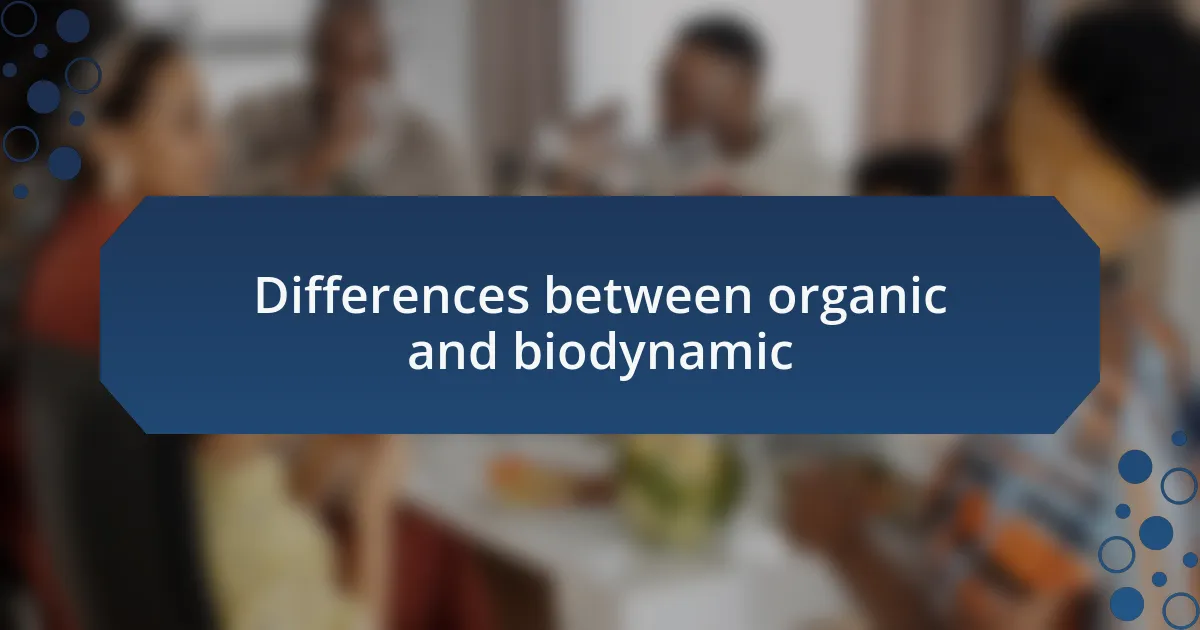
Differences between organic and biodynamic
When comparing organic and biodynamic practices, one standout difference lies in the philosophy behind each approach. Organic farming strictly adheres to regulations that prohibit synthetic pesticides and fertilizers, while biodynamic farming integrates cosmic rhythms and spiritual science into its practices. I once tasted a biodynamic wine that had a distinct vibrancy, prompting me to ponder how much the philosophy behind the vine contributes to the final product.
Another critical distinction is the treatment of soil and crop health. Organic methods prioritize chemical-free solutions, yet biodynamic practices go a step further by enhancing the soil’s vitality through compost preparations and planting cover crops that enrich the ecosystem. I remember chatting with a biodynamic viticulturist who emphasized how healthy soil not only impacts the grapes’ quality but transforms the entire vineyard culture. Isn’t it fascinating to think that the health of our wine might originate from the unseen organisms in the dirt beneath our feet?
Moreover, biodynamic vineyards often operate as self-contained ecosystems, which differs sharply from conventional organic farms that may still rely on external inputs. This approach fosters a sense of belonging and interconnectedness; I felt this keenly while exploring a biodynamic estate that features diverse plant life and livestock. It made me reflect on how these elements contribute to the wine’s unique terroir—a concept that celebrates the essence of the land. How can we overlook the myriad influences that surround and nurture the grapes we cherish in our glasses?

My experience with biodynamic wine
Biodynamic wine production has offered me a unique sensory experience that goes beyond taste. I remember sitting on a sun-drenched terrace, savoring a glass of biodynamic red, and I felt as if each sip was infused with the very essence of the vineyard’s life force. How incredible is it that a wine can reflect its surroundings so profoundly?
One day, while volunteering at a biodynamic vineyard, I witnessed firsthand the meticulous nature of their practices. Each task felt almost ritualistic, whether it was applying prepared compost or observing the lunar calendar for optimal planting times. It made me realize that biodynamics is not just about producing wine; it’s a holistic approach that invites us to appreciate the interconnectedness of nature. Have you ever noticed how a wine can resonate with the energy of its origins?
During another tasting, I noticed an unusual depth in a biodynamic Chardonnay. The flavors weren’t merely a product of the grape; they were a symphony of earth, sky, and the careful, mindful hands that cultivated them. I couldn’t help but wonder how much this immersive philosophy nurtures our palate, creating wines that are not just drinks but true expressions of their landscapes. Isn’t it thrilling to think that we’re partaking in something so deeply connected to the environment?
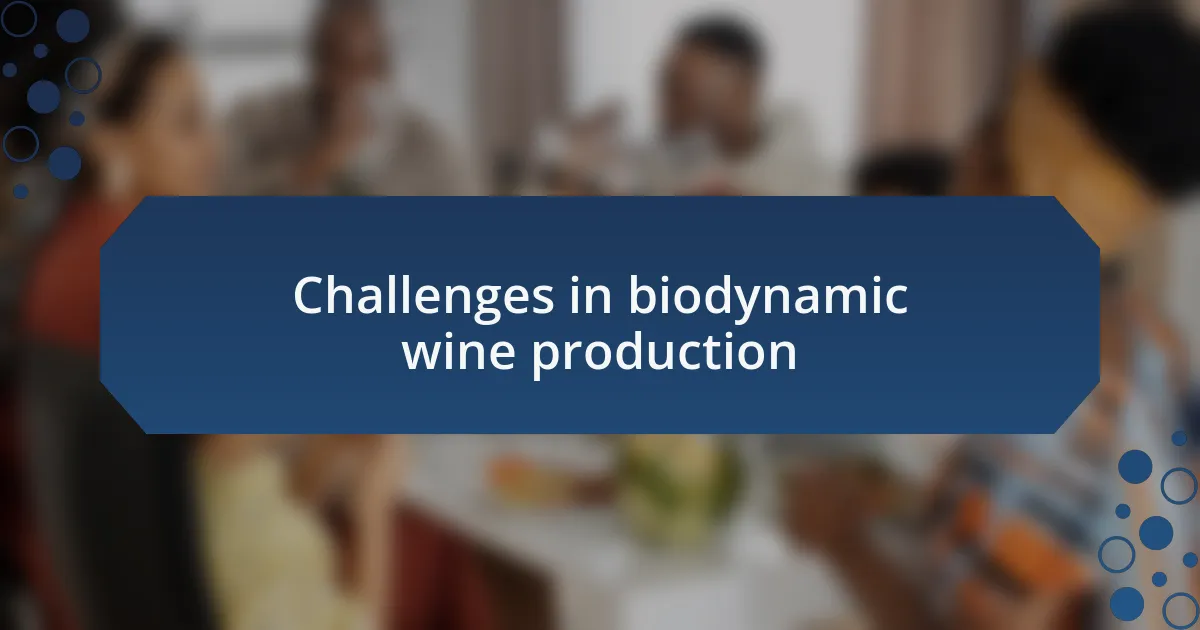
Challenges in biodynamic wine production
When I first delved into biodynamic wine production, I was fascinated by its ecological philosophy, but I quickly realized it comes with significant challenges. There’s a rigorous adherence to cosmic rhythms and organic methods, which can be daunting, especially for those just starting out. Have you ever tried balancing precise timing with unpredictable weather conditions? It can be quite the juggling act.
Financial sustainability is another hurdle that many biodynamic producers face. I remember chatting with a winemaker who candidly shared that the cost of maintaining biodynamic certifications and practicing these methods can be overwhelming. It’s a commitment that often necessitates sacrificing some profitability for quality and ecological integrity. Isn’t it fascinating how the desire for purity can sometimes lead to tough economic choices?
Moreover, there’s the challenge of perception. I’ve found that some consumers remain skeptical about biodynamic practices, viewing them as esoteric or unsubstantiated. This disconnect can make it difficult for small producers to find their market. It’s compelling to think about how much education is needed to bridge that gap—how can we help people appreciate the depth and intention behind these practices, especially when the wine within the bottle tells such a beautiful story?
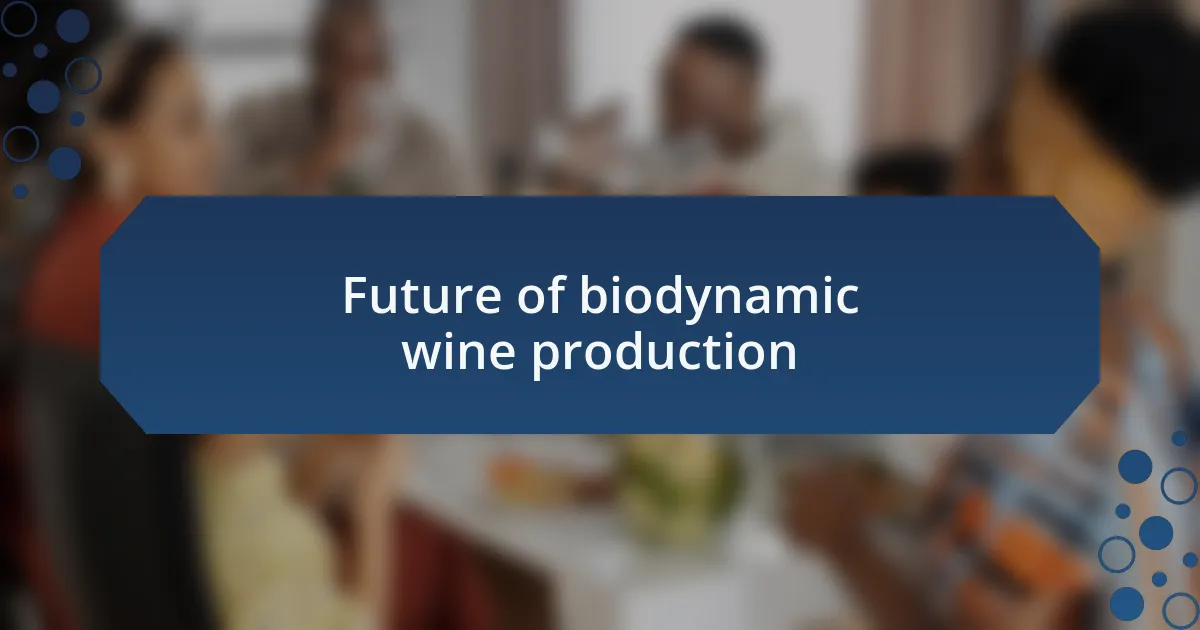
Future of biodynamic wine production
I believe the future of biodynamic wine production holds great promise amid growing consumer awareness of sustainable practices. As more people seek wines that reflect their values, biodynamic methods, with their emphasis on ecological balance and holistic health, are likely to resonate deeply. Have you noticed how consumers today are increasingly willing to invest in products that prioritize quality and environmental stewardship?
From my observations, the community surrounding biodynamic wine is evolving, with more young winemakers embracing these principles. I recently met a passionate vintner who shared how collaborative networks are sprouting, where producers exchange insights and support one another through challenges. Isn’t it inspiring to see a new generation eager to innovate while respecting traditional methods?
Looking ahead, I can’t help but think about the role of technology in enhancing biodynamic practices. For instance, advancements in data collection could help vintners better understand their land’s unique characteristics while still adhering to biodynamic principles. This integration of old and new could significantly improve outcomes without sacrificing the core beliefs that define biodynamic wine production. Isn’t it fascinating how the future might blend science with nature in such a harmonious way?